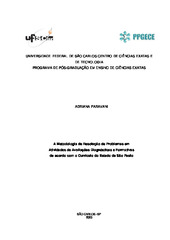A metodologia de resolução de problemas em atividades de avaliações diagnósticas e formativas de acordo com o currículo do estado de São Paulo
Abstract
This dissertation aims to present research about Improving classroom practices for Mathematics Teaching based on the Problem-Solving Methodology applied in the analysis of the Diagnostic evaluation results. The study started in 2021 at the gradual return after school isolation imposed by the pandemic of COVID - 19, in 2020 and 2021, with a selection of problems from SARESP and one OBMEP problem, in order to understand the concept of Diagnostic Evaluation in the knowledge of students returning to the school. The phases of the Problem-Solving Methodology were used to evaluate the gaps in the content knowledge and skills of students from 7th graders of a public municipal school. The study in 2021 reflected in Diagnostic Evaluation when the school returned in 2022, as a base for the lesson planning for presential classes resumed with material from the São Paulo State curriculum. The 2021 study made it possible for the author to interpret the results of quantitative diagnosis through the resolution phases in proposed problems, helping to connect them to the gaps detected in the concept knowledge and skills brought by students when compared to the expected learning established by the curriculum for the level. This dissertation presents as result of the research the author’s learning about how the phases of problem-solving are related to formative evaluation along the regular school calendar, having as consequence the understanding about better teaching practice in the classroom that focus on the efficient development of skills established by curriculum, considered the students´ prior knowledge and needs.
Collections
The following license files are associated with this item:

